1. Opening the Session
This section describes how to open the session and prepare participants to engage with the material. It includes:
- Welcome and territory acknowledgement
- Goals and objectives
- Practical information
- Support and self-care for participants
- Group guidelines
These slides are available for use with this section of the presentation. For information about downloading the slide deck, see the Introduction.
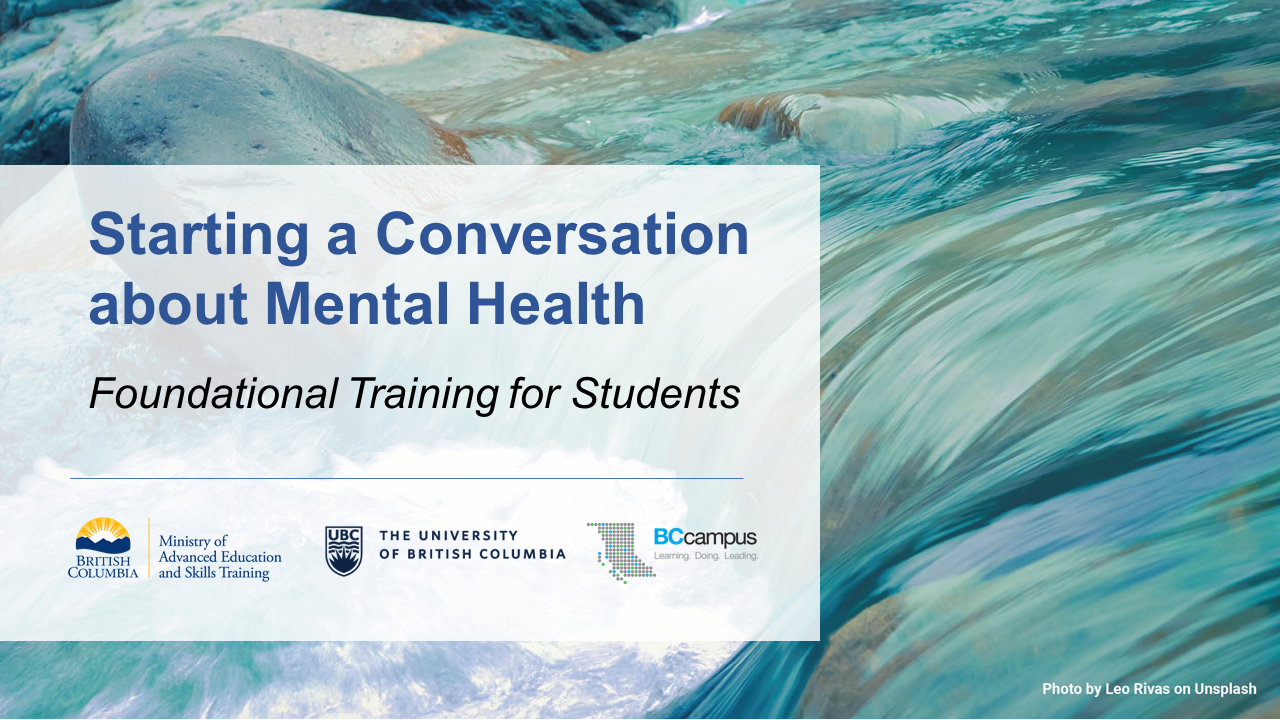

Welcome
Welcome participants and open with a territory acknowledgement. If you’re unsure of your territory, Native-Land.ca is a helpful resource.
Territory Acknowledgement and Indigenous Ways of Knowing and Being
A meaningful territory acknowledgement allows us to develop a closer and deeper relationship with not only the land but also the traditional stewards and peoples whose territories we reside, work, live, and prosper in.
Acknowledging the territory within the context of mental health and well-being can open a person’s perspective on traditional ways of knowing and being, stepping out of an organizational structure and allowing participants to delve into their own perceptions, needs, and abilities.
Territory acknowledgements are designed as the very first step toward reconciliation. What we do with the knowledge of whose traditional lands we are on is the next important step.
Some questions to consider as you acknowledge your territory:
- What do we do as good guests here?
- What can I do in my personal and professional roles to contribute to reconciliation?
Should your institution have an approved territory acknowledgement, please use that to open the session; however, we invite you to consider how to make that institutional statement more personal and specific to you, in that moment and in the work you are about to delve into with your participants.
Opening Check In
After the welcome, introduce yourself. You could then ask participants to very briefly introduce themselves, or you may want to start the session with a short participant check in as a way to invite people into a learning space. You could ask participants to share their name, what they study, and what they are hoping to get out of the session. If you’re offering the session online, you could also do an online poll that asks people to choose the type of weather that matches how they are feeling. There are many different ways to have participants check in with themselves and the group, and we invite you to use questions and reflections that are meaningful to you and the group.
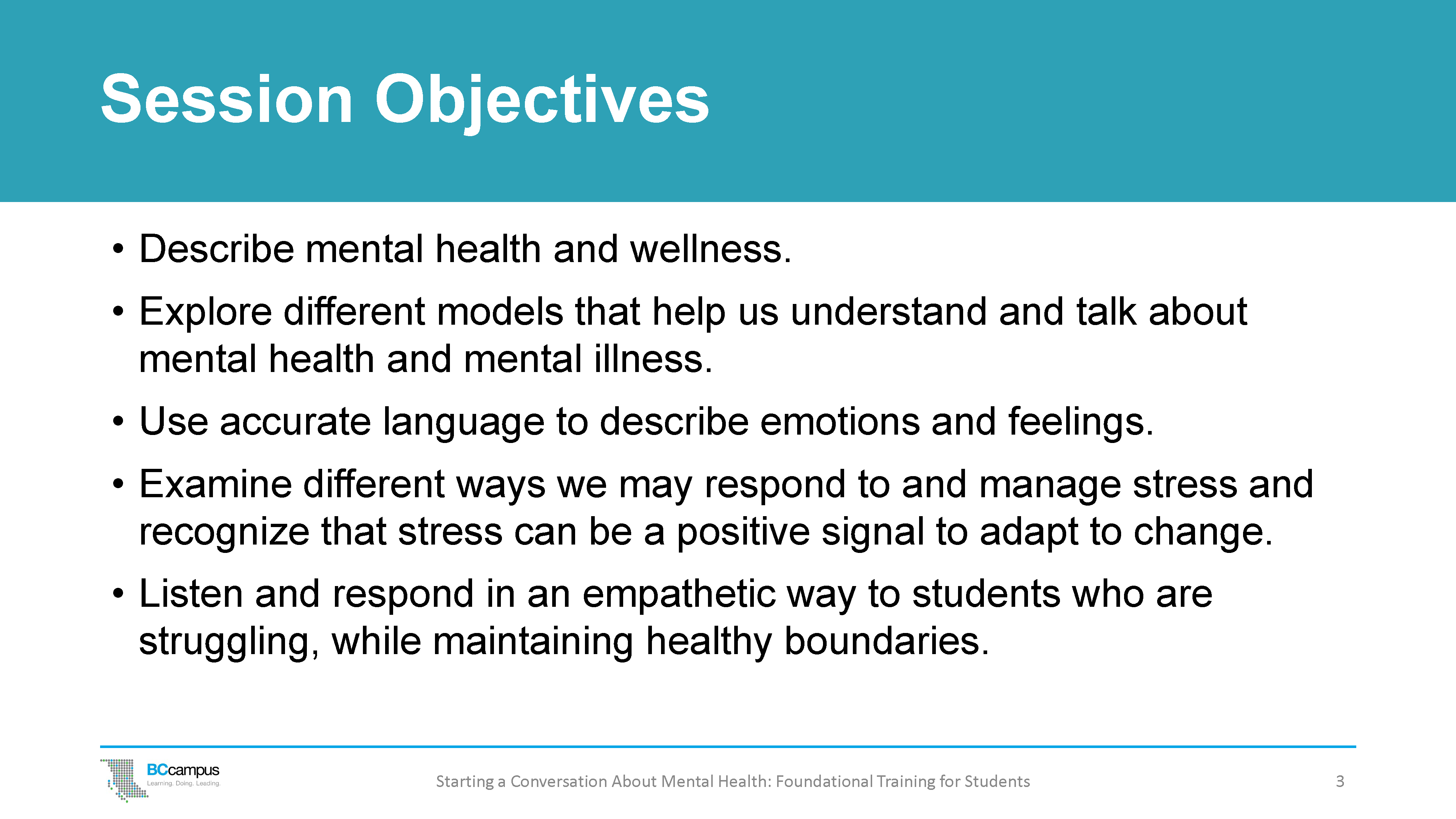
Goals and Objectives
The overall goal of this session is to help you develop the knowledge and skills to maintain good mental health, cope with stress, and support other students who are struggling with stress and mental health.
After participating in the session, you will be able to:
- Describe mental health and wellness.
- Explore different models and frameworks that help us understand and talk about mental health and mental illness.
- Use accurate language to describe emotions and feelings.
- Examine different ways we may respond to and manage stress and recognize that stress can be a positive signal to adapt to change.
- Listen and respond in an empathetic way to other students who are struggling, while maintaining healthy boundaries.
This session offers foundational information on mental health, as well as opportunities to practise listening and supporting other students in an empathetic way.
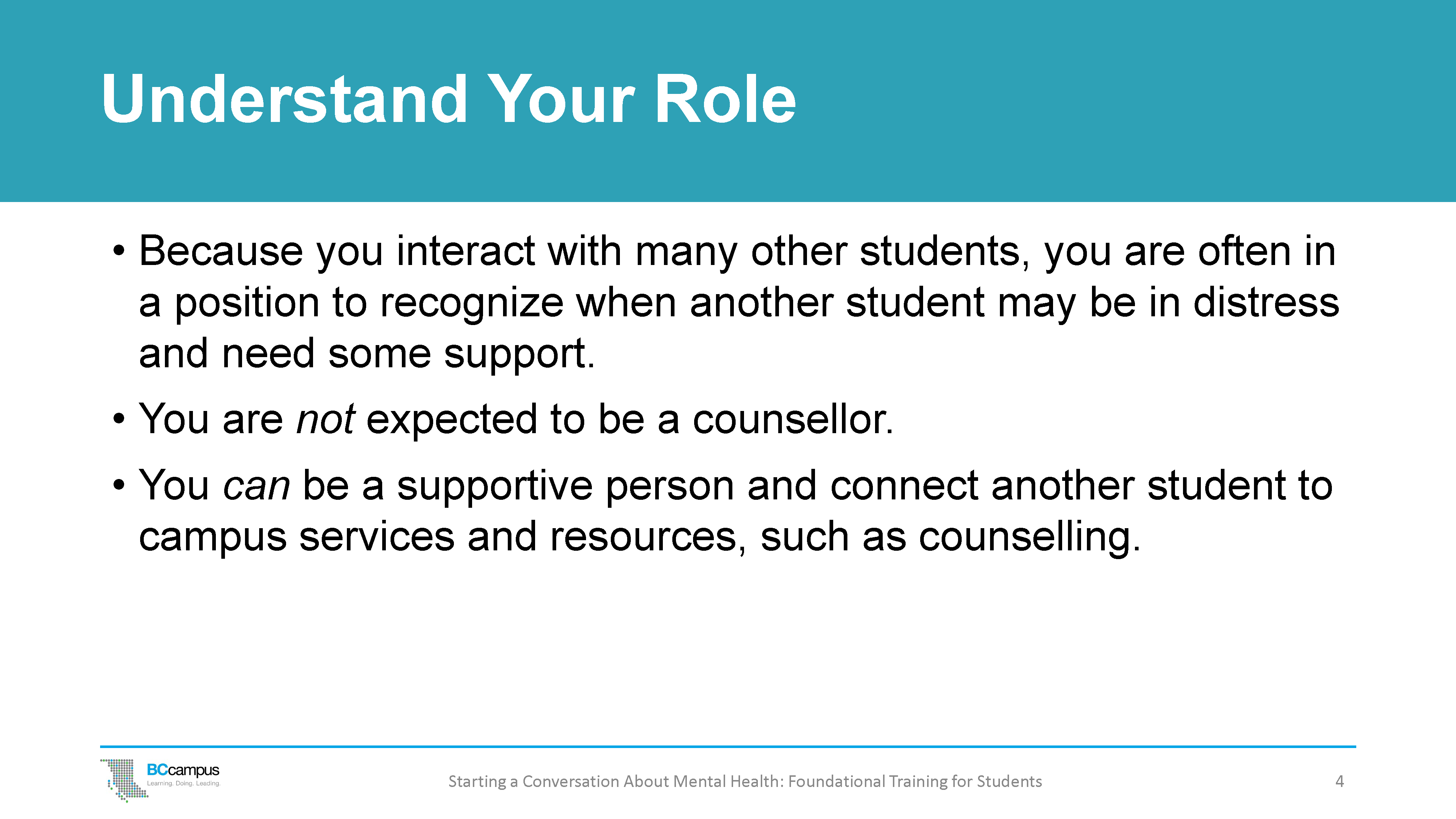
It is important to remember that you are not a counsellor or mental health professional. Nobody expects you to act as a counsellor, and you cannot, and should not, diagnose mental illness, nor should you provide mental health care. However, you can be an important component of the caring community of people who can surround and support another student in need.
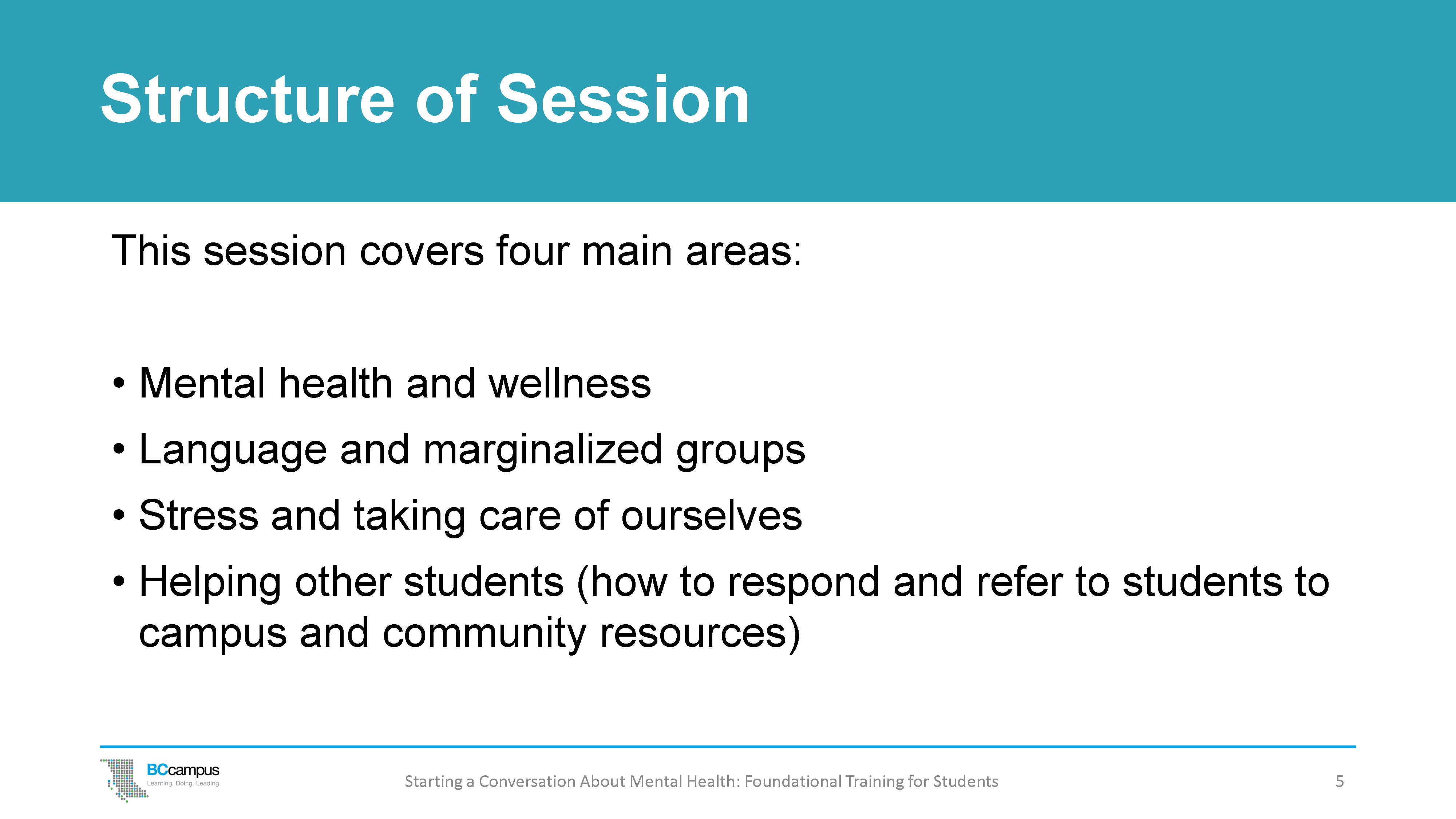
Structure of the Session
The session covers four main areas:
- Mental health and wellness
- Language and marginalized groups
- Stress and taking care of ourselves
- Helping other students (how to respond and refer to students to campus and community resources)
This is foundational training in mental health. It doesn’t cover suicide awareness, which requires more in-depth training. However, we do cover what to do in an emergency.
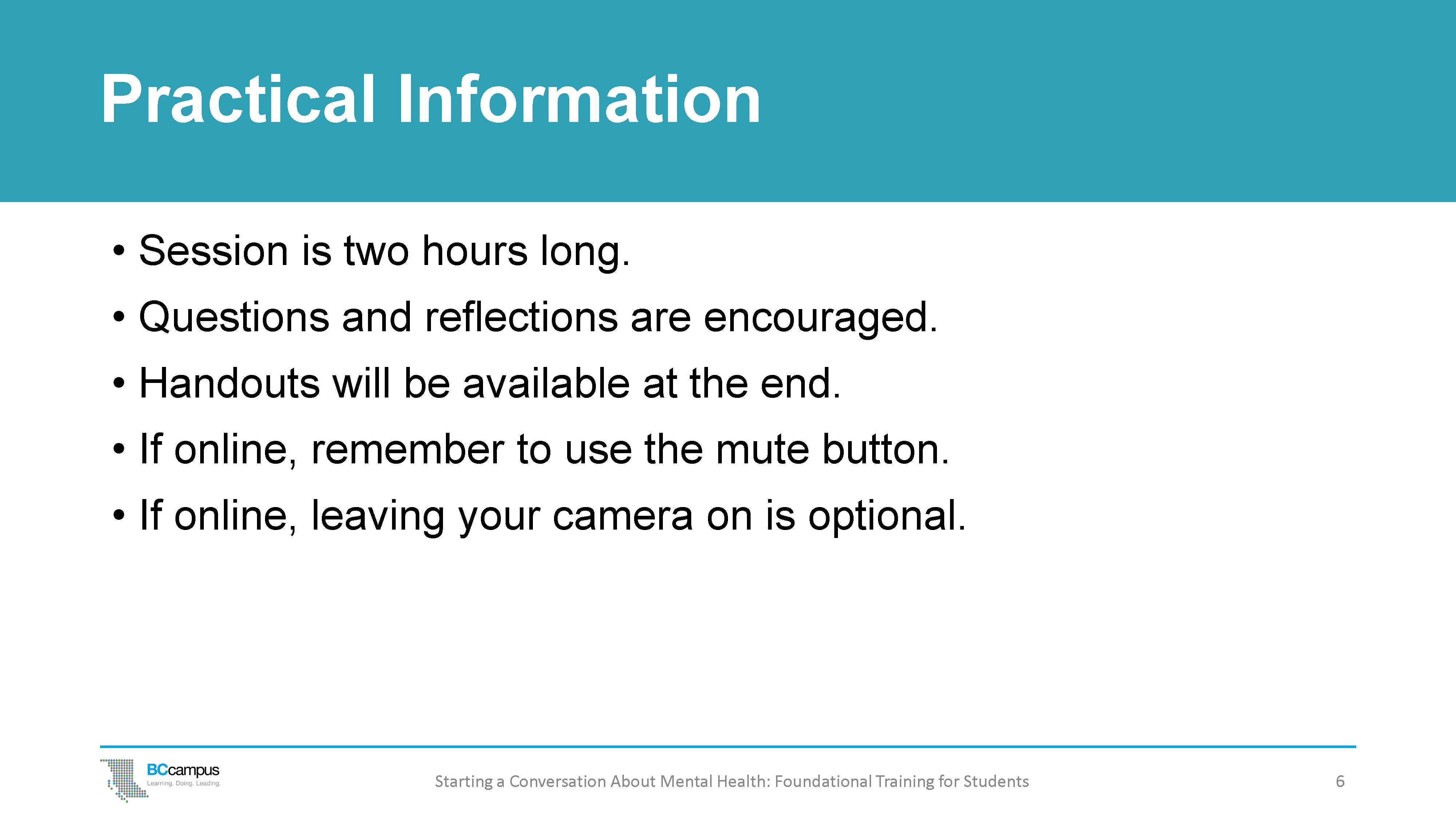
Practical Information
As you engage with the content of the session, reflect on how it might apply to situations you have experienced yourself or with your peers.
You are encouraged to:
- Provide feedback and share your input during the discussions, as this will increase the learning opportunities
- Jot down notes during reflection activities
- Ask any questions you might have during the session
After the session, you will have access to printable (PDF) handouts.
If you are facilitating this session online, remind participants that they can turn off their cameras and move around the room during the session. Ask them to be mindful of using the mute button to reduce noise in the online space.
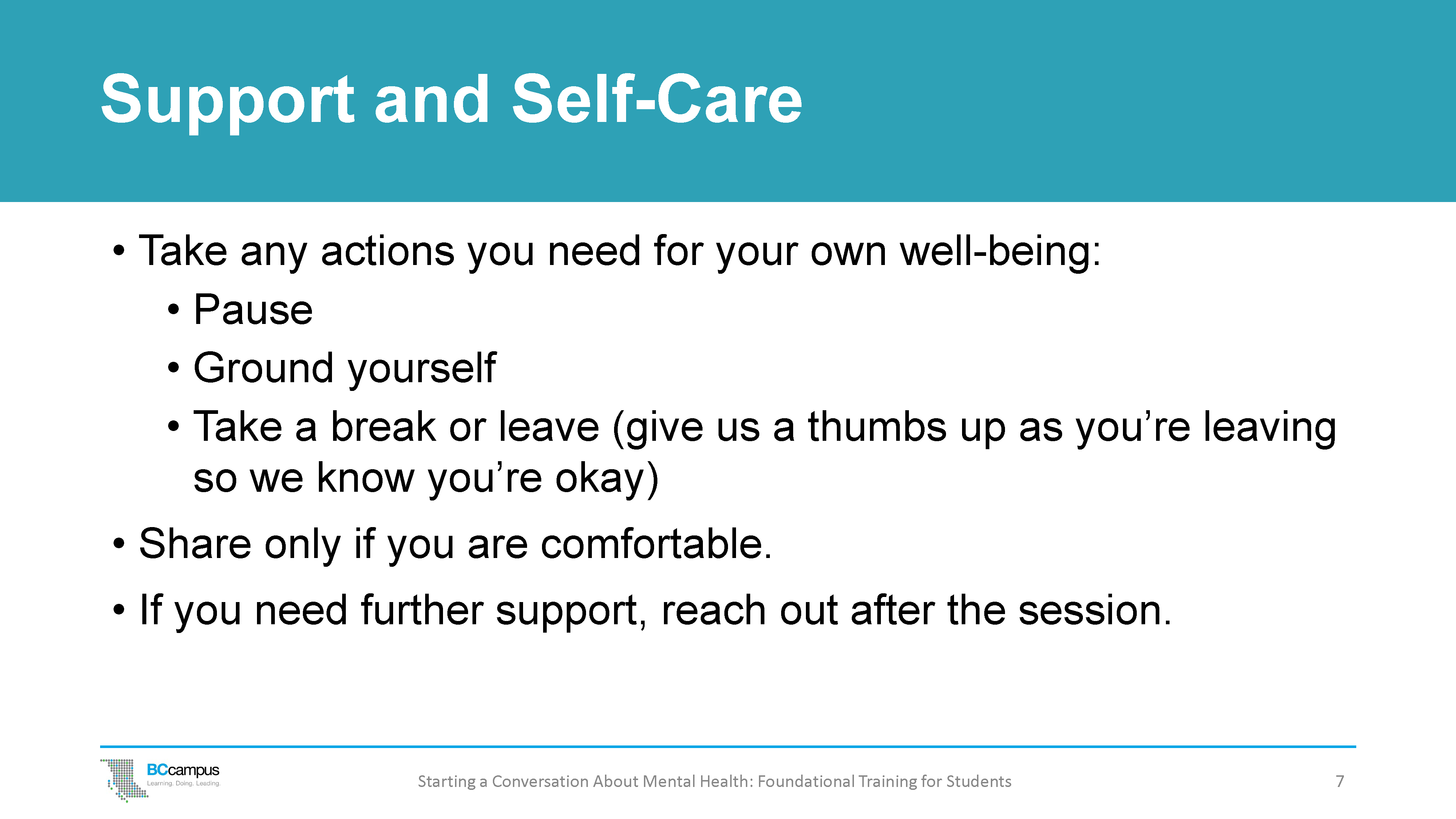
Support and Self-Care for Participants
You are invited to do whatever you need to do to take care of yourself throughout the session.
This may be a difficult topic for some of you. Everyone will have been touched in some way by the topics that will be discussed in the session. Feel free to pause, take a break, stretch, and ground yourself at any time.
You can share at the level that you feel comfortable with. If anything comes up in the session that feels too important or difficult to handle on your own, don’t hesitate to reach out to the appropriate services, such as counselling services, to debrief or discuss it further. If you prefer not to share, that’s okay.
If you need to leave, that’s okay too.
For in-person sessions, you could suggest that if a participant does need to leave a session that they give a thumbs-up as they go to let you know they’re okay. Tell everyone that if you don’t see a thumbs-up, you’ll ask a colleague to look for the participant outside the session to make sure they are alright.
Breathing Exercise
To begin, you could have the group engage in a breathing exercise to set the tone for the session, to give participants a few moments to become aware of their own emotional well-being, and to practise a stress management technique. Note: There is also an opportunity to do a box breathing later in the session in “What to Do When We’re Stressed” if you prefer to wait to do this exercise.
We’re going to start with a breathing exercise called box breathing. You can do this if you start to feel overwhelmed at any point in the session. It can help bring your heart rate back to normal, so you feel a little more relaxed. Here’s how how you do it:
- Step 1: Inhale (preferably through your nose) for a count of four.
- Step 2: Hold your breath for a count of four. You’re not trying to deprive yourself of air; you’re just giving the air a few seconds to fill your lungs.
- Step 3: Exhale slowly through your mouth for a count of four.
- Step 4: Pause for a count of four before breathing again.
Box breathing is a simple stress management exercise that can be practised anywhere. You can practise it for only a minute or two and experience the immediate benefits of a calm body and more relaxed mind.
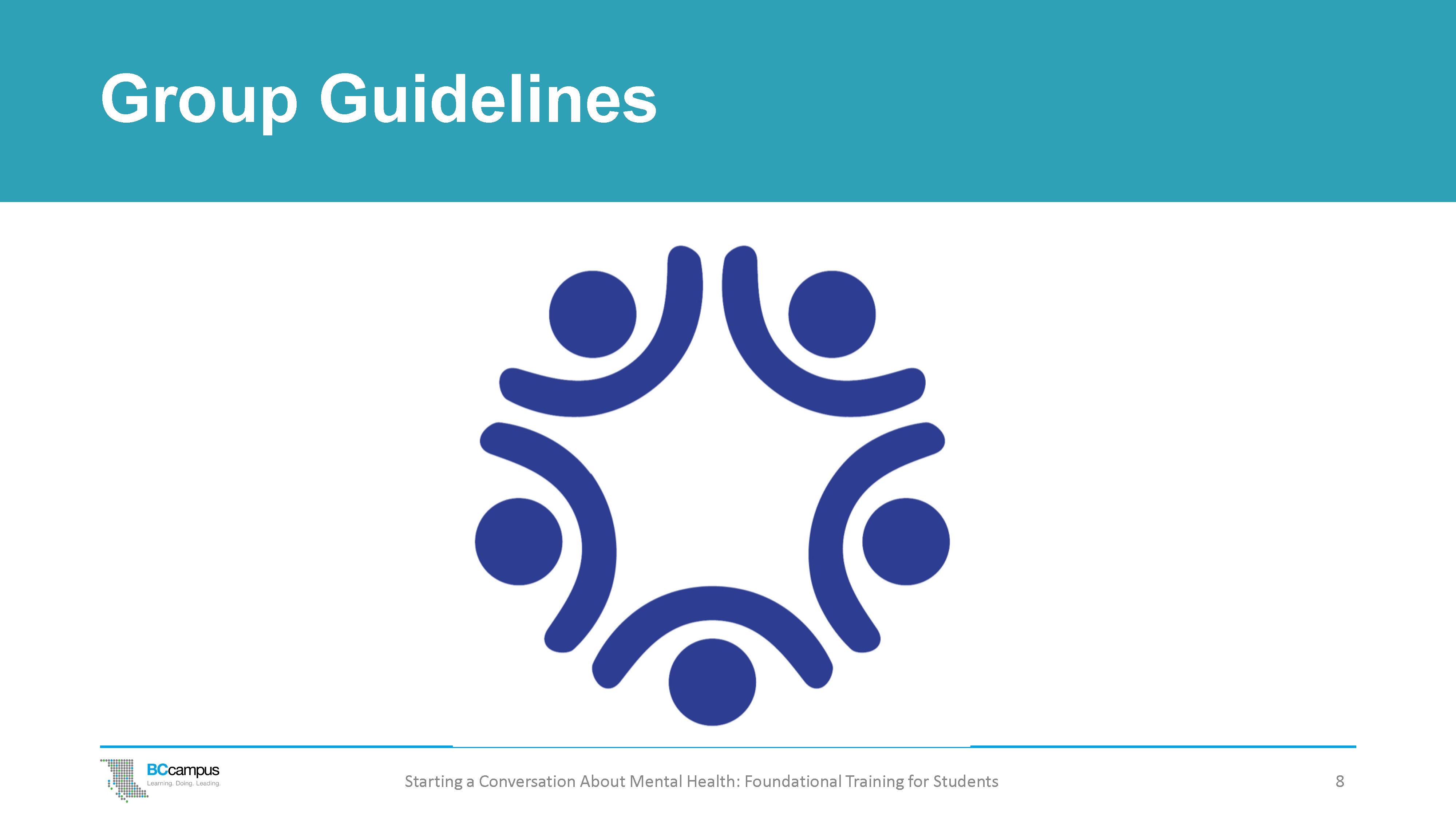
Group Guidelines
It is helpful to set some expectations and boundaries for the discussion. For example:
- This is a learning environment, and not a therapy group.
- What comes up in this room – whether in person or online – stays in the room.
- We expect you to be non-judgmental of each other and show extra sensitivity when engaging in discussion during the session. This session is about gaining a little more comfort and confidence in dealing with this topic.
You could also ask participants to share ideas for group guidelines at the beginning of the session, or you could share a list of guidelines before the session begins to save time during the session. (See Group Guidelines.)
Text Attributions
- “Territory Acknowledgement and Indigenous Ways of Knowing and Being” by Jewell Gillies (CC BY 4.0 License). All other text in this section by Barbara Johnston and Liz Warwick (CC BY 4.0 License).
Media Attributions
- Clear Blue Running Water at Daytime by Leo Rivas is used under an Unsplash License.
- Lake in Dome Creek, BC by Jakub Fryš is used under a CC BY-SA 4.0 license.

